 Marine Debris
Marine Debris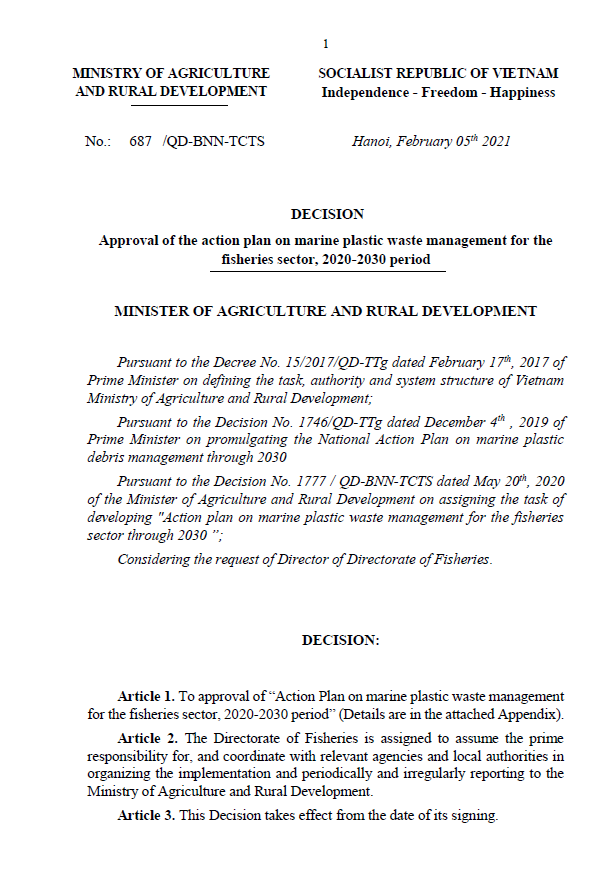
2021 | Ministry of Agriculture and Rural Development (MARD)
Keywords: Fisheries, Plastic, Waste
On 5 February 2021, the Viet Nam Ministry of Agriculture and Rural Development (MARD) issued the Decision 687/QD-BNN-TCTS to approve the action plan on marine plastic waste management in the fisheries sector (2020 – 2030). The Decision has received high appreciation from relevant stakeholders as the fisheries sector is a pioneer in developing their first action plan to reduce plastic waste pollution. This movement has been seen as one of important milestones for the fisheries sector to take vigorous and consistent measures to reduce plastic waste pollution in the country.
The action plan aims to reduce plastic waste in fisheries production by gradually managing marine plastic waste from source to the sea, implementing a circular economy approach, developing a green economy, and raising awareness and social responsibility of farming and fishing communities, fishermen and business sector. The plan will also contribute to the successful implementation of the Decision No. 1746 / QD-TTg dated December 4, 2019 of the Prime Minister on the National Action Plan for marine plastic waste management until 2030.
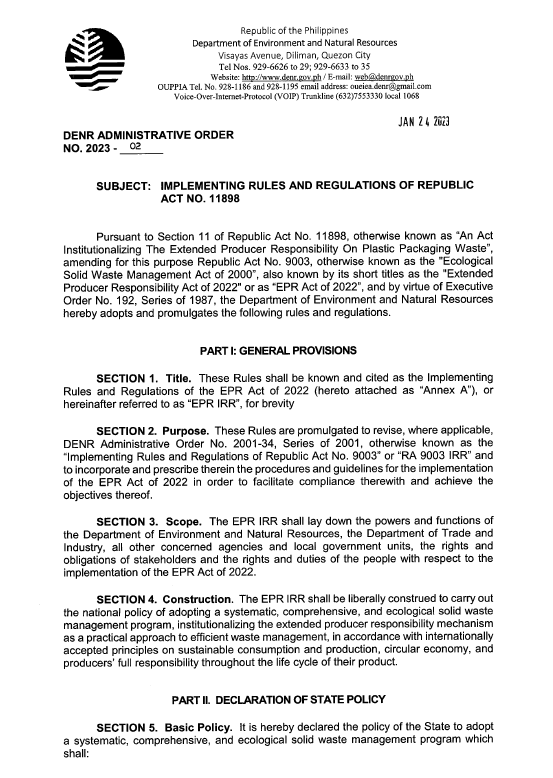
2023 | Department of Environment and Natural Resources (DENR)
Keywords: EPR, Extended Producer Responsibility, Circular Economy, Philippines, Waste Management
The Department of Environment and Natural Resources (DENR) has issued the implementing rules and regulations (IRR) of Republic Act 11898, also
known as the Extended Producer Responsibility (EPR) Act of 2022. This law requires large-scale companies to establish a mechanism for the recovery of their plastic packaging. Through the EPR, obliged companies "have the responsibility for the proper and effective recovery, treatment, recycling or disposal of their products after they have been sold and used by consumers" to reduce the volume of plastic wastes generation and extend the life of plastics by adding value or purpose through upcycling or recycling. The EPR law will also help in advancing a circular economy that mitigates climate change and protects our life-supporting ecosystems by avoiding or minimizing pollution while maximizing the use of materials.
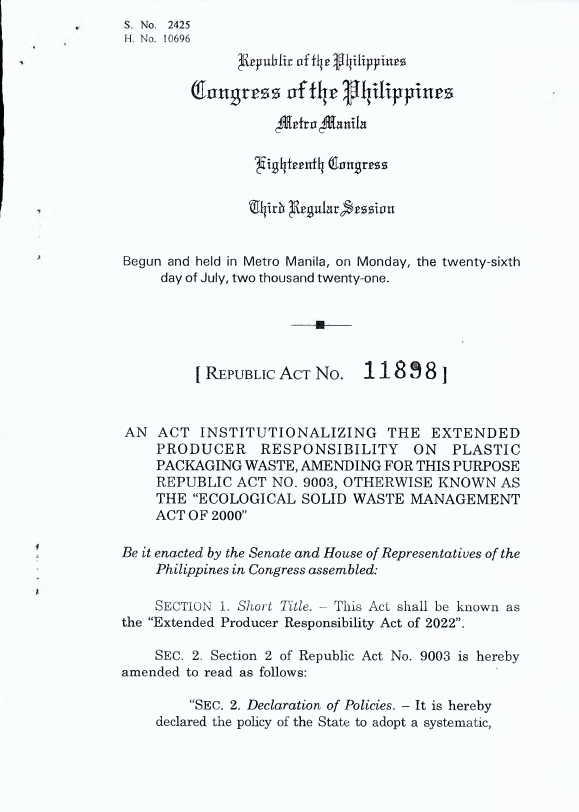
2022 | Department of Environment and Natural Resources (DENR)
Keywords: EPR, Extended Producer Responsibility, Circular Economy, Philippines, Waste Management
In 2022, Republic Act (“RA”) No. 11898, otherwise known as the Extended Producer Responsibility (“EPR”) Act of 2022 was passed as an amendment to RA No. 9003 or the Ecological Solid Waste Management Act. The law sought to institutionalize the practice of extended producer responsibility as a practical approach to efficient waste management, with a focus on waste reduction, recovery and recycling, and the development of environment-friendly products. The law will advocate the internationally accepted principles on sustainable consumption and production, circular economy, and producers’ full responsibility over the life cycle of their products. To implement the said law, the Department of Environment and Natural Resources (“DENR”) issued Administrative Order 2023-02 (“EPR IRR”) on 24 January 2023.
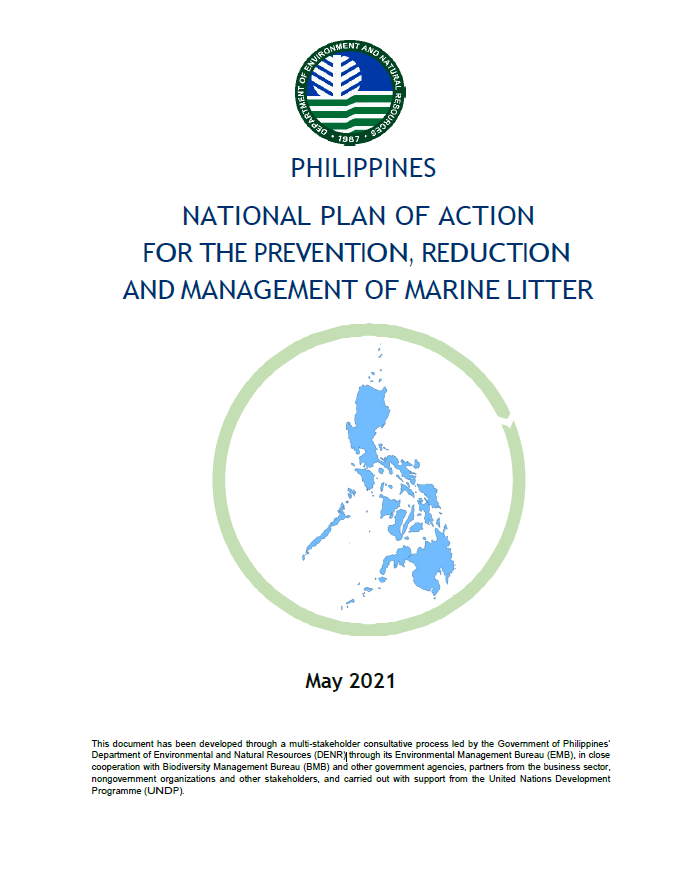
2021 | Environmental Management Bureau, Department of Environmental and Natural Resources (DENR)
Keywords: Marine litter, Waste leakage, Waste management, Philippines
The National Plan of Action for the Prevention, Reduction and Management of Marine Litter (NPOA-ML) has been developed to provide a blueprint to enhance the current efforts of the country in resource and waste management and to bring additional lens to marine litter issues and the control of additional leakage of waste into bodies of water.
The global transboundary nature of marine litter has been emphasized with the presence of floating debris in oceanic gyres and had been put to light with secondary studies that rank the Philippines as the third largest contributor to ocean plastic litter. While such findings need country validation, the Department of Environment and Natural Resources (DENR), through its Environmental Management Bureau (EMB) and Biodiversity Management Bureau (BMB), set out to bring experts and actors together to examine the issues, policies, ongoing initiatives, and remaining gaps with the goal of developing the NPOA-ML through a multi-stakeholder participatory process.
The processes involved in developing the NPOA-ML consist of a series of DENR core group meetings, levelling meetings, and multi-stakeholder, multi-sectoral workshops.

2023 | Ministry of Environment and Natural Resources (MONRE) Viet Nam
Keywords:
This report brings in a brief overview on the baseline of marine plastic management in Vietnam, and proposes some suggestions for improvement of the current effort on marine plastic management for a healthy and sustainable marine environment.
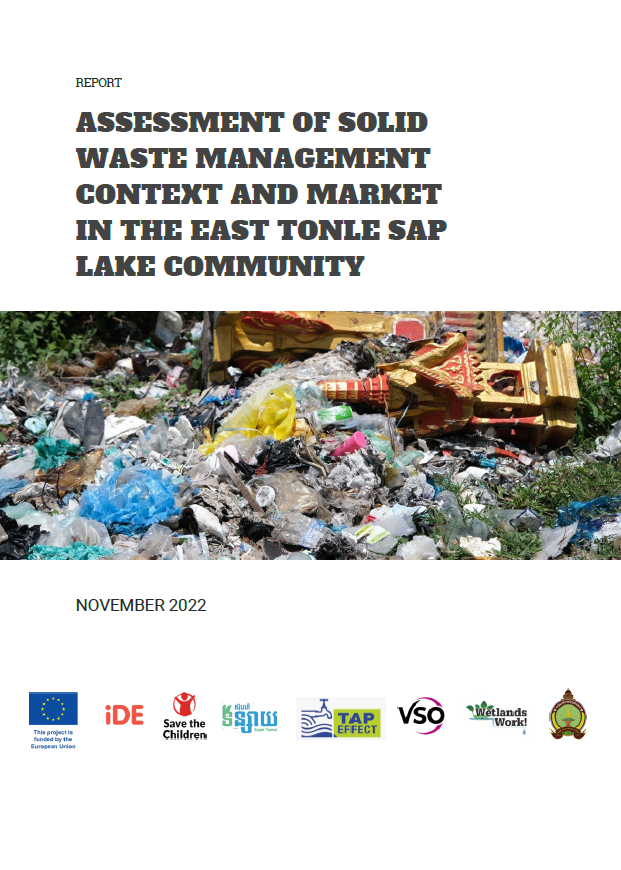
2022 | iDE
Keywords: Solid Waste Management (SWM) East Tonle Sap Lake (ETSL), Waste Collection & Recycling, Informal Waste Sector, Environmental Challenges, Community Waste Practices
Solid waste management (SWM) is an ongoing problem worldwide. As part of the GREEN Project, funded by the European Union, the research team has focused on SWM solutions for areas bordering the East Tonle Sap Lake (ETSL) in three provinces in Cambodia: Pursat, Kampong Chhnang, and Kampong Thom. This research is a foundational step in developing relevant SWM solutions for these communities and focuses on understanding the current solid waste landscape in the ETSL area, identifying relevant stakeholders and actors, and identifying areas of opportunity for SWM solutions.
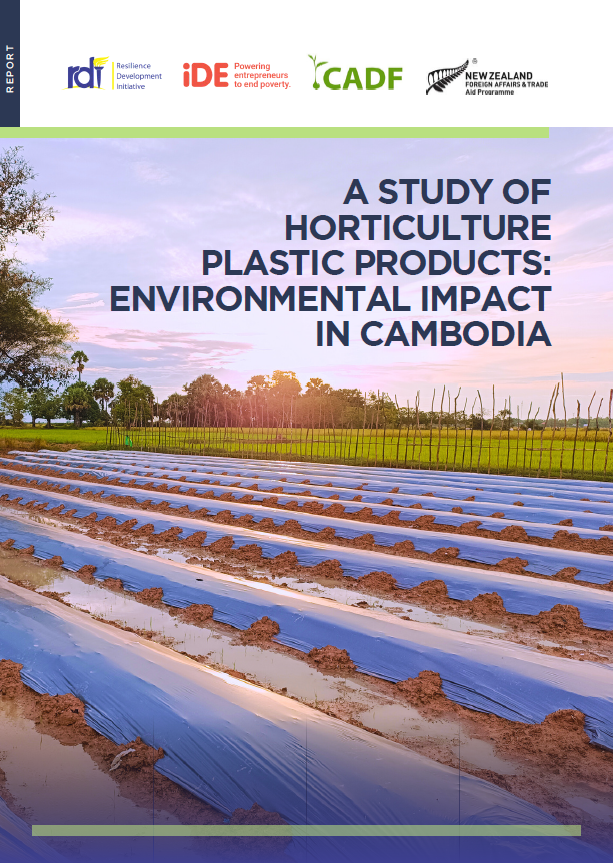
2024 | Resilience Development Initiative (RDI) and iDE
Keywords: Horticulture, Plastic waste management, Microplastics, Environmental impact, Circular economy, Multistakeholder Collaboration
Agriculture has been the backbone of the Cambodian economy for centuries. In recent years, the sector has undergone a period of rapid growth and transformation, driven by a number of factors, including increased investment, improved productivity, and expanded trade. The horticulture sector in Cambodia is an important part of the agricultural economy due to a rapidly increasing urban consumption demand for fruits and vegetables. In spite of this, horticultural plastic products may have a negative environmental impact if the waste management is not done properly. This study was conducted to estimate the use of horticultural plastics and plastic waste management by farmers in Cambodia. The results showed that plastic mulch is the most commonly used horticultural plastic, followed by driplines and plastic nets. The estimated potential horticultural plastic usage is approximately 515,450 tonnes/year, which accounts for up to 12% of waste generation throughout Cambodia. Farmers agree that improper plastic waste management could negatively affect the environment and health of the community, but the majority of farmers burn or bury their plastic waste due to the lack of waste management infrastructure in rural areas. The study also found plastic remnants in horticultural fields in the form of macroplastics and microplastics, which can cause negative impacts on human health and the environment. The study suggests several possible interventions to reduce the negative impact of horticultural plastics, including increasing the circularity of plastic products and developing alternatives for agricultural plastic products. These interventions can be made possible by multistakeholder collaboration, namely farmers, governments, private sectors, and NGOs.
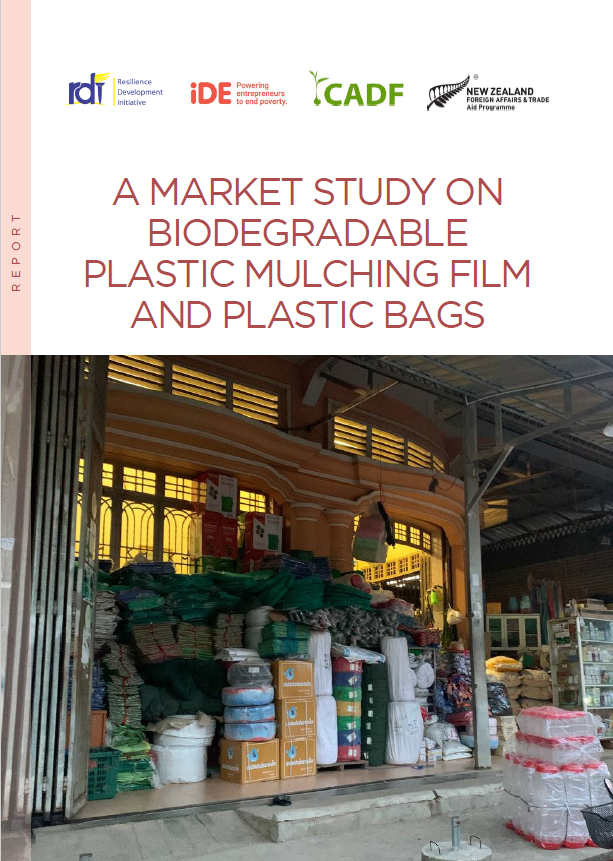
2024 | Resilience Development Initiative (RDI) and iDE
Keywords: Biodegradable, Agricultural Management, Plastic Pollution, Private Sector
This market study is the initiative of iDE Cambodia to understand the use and subsequent impact of agricultural plastic in Cambodia. The study was done with the support of Resilience Development Initiative (RDI). The project assessed the behavioural usage of plastic and its agricultural management, including a market study of its alternative potential conducted in five Cambodian provinces: Battambang, Kandal, Oddar Meanchey, Banteay Meanchey and Siem Reap. The purpose of this study is to understand the market size of biodegradable plastic, which include plastic mulching and plastic bags. Plastic mulch is the centre of this study since our findings show plastic mulch is the most plastic used in horticulture. Plastic products have been used extensively in the horticulture sector in Cambodia due to their versatility. However, the use of plastic products in horticulture also contributes to plastic pollution and waste in agriculture. Therefore, there is a need to promote sustainable farming practices, reduce plastic usage in horticulture or replace plastic products with an environmentally friendly material such as compostable plastic or bioplastic. This practice can only be achieved through the participation of the private sector involved in the plastic product supply chain (i.e. manufacturer, wholesaler, distributor and retail). As such, this report aims to provide related information for the private sector to contribute to biodegradable plastic production.
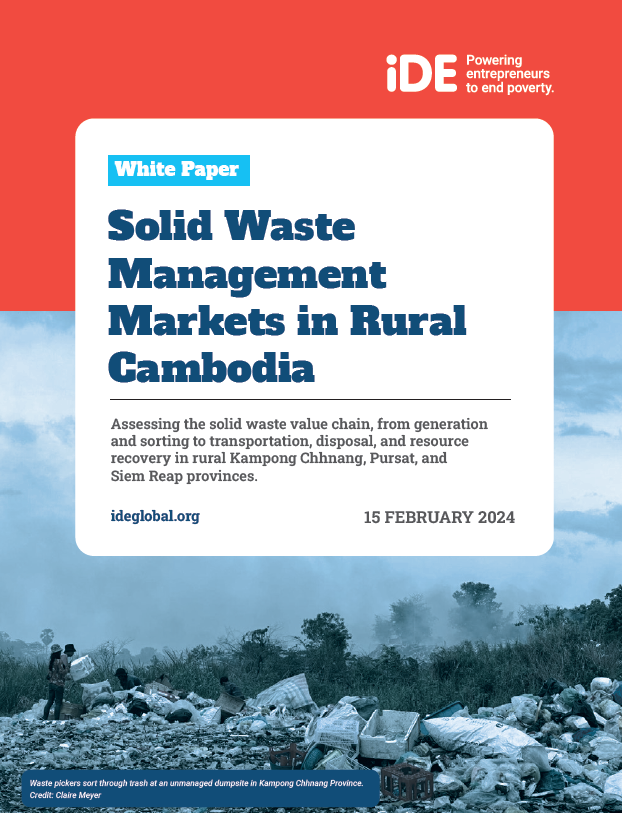
2024 | iDE
Keywords: Rural, Cambodia, Solid Waste Management, Solid Waste Value Chain, Waste Collection
Approximately 75 percent of Cambodia’s 17 million residents reside in rural areas, where residential waste collection services are largely absent. Nationally, four percent of waste is estimated to be recycled. As a result, rural households, businesses, and communities often defer to unsafe and unsustainable means for waste disposal, including burning, burying and open dumping. To collect waste, protect human health and keep trash out of the natural environment, it is critical that solid waste management (SWM) expands in rural areas to meet growing and urgent needs.
This white paper examines the current state of SWM in rural Cambodia, with a specific focus on three Cambodian provinces: Kampong Chhnang, Pursat, and Siem Reap. The research team conducted a market assessment through literature review, primary data collection with stakeholders, and an experimental demand generation test. Findings highlight each stage of the waste management process, from waste generation to collection, transportation, disposal, and processing/recycling from the perspectives of local community residents, the private sector, and representatives of the public sector.

2024 | The Asia Foundation
Keywords: Marine Plastic Leakage, Solid Waste Management, Behavioral Change, Plastic Waste
Kratie Municipality, situated along the Mekong River, is located 340 kilometers from Phnom Penh. Known for its sandy beaches and as a habitat for the endangered Irrawaddy dolphins the town is home to a population of 32,939. Kratie’s economy largely revolves around agriculture, including rice and corn farming, fishing, and rubber and cassava plantations, along with a growing business, tourism, and professional sector. Kratie faced significant waste management challenges prior to the 3RproMar initiative, with just over half of households having waste collection services and much of the waste being disposed of in an unsustainable open dumping site. Inadequate infrastructure, limited budget, and a lack of public awareness about waste segregation led to widespread littering, dumping, and burning, contributing to plastic leakage and other environmental impacts directly affecting the Mekong River. Additionally, informal waste workers played a key role in recycling, but their efforts were unregulated, resulting in inconsistent practices and at times posing health risks.
This final report for the 3RproMar Kratie Pilot provides a comprehensive overview of the initiatives undertaken to reduce marine plastic leakage in Kratie Municipality, Cambodia. Led by TAF, in collaboration with GIZ, the project aimed to improve SWM, enhance plastic recycling, and foster behavioral change among residents. Over its extended two year and nine months implementation period, the project focused on addressing the municipality's waste management challenges by designing scalable solutions to reduce plastic waste entering the marine environment while building environmental resilience.
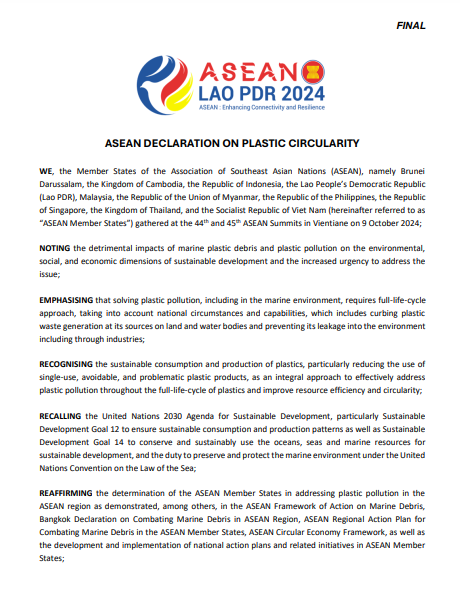
2024 | ASEAN
Keywords: Asean, Declaration, Plastic Circularity
WE, the Member States of the Association of Southeast Asian Nations (ASEAN), namely Brunei
Darussalam, the Kingdom of Cambodia, the Republic of Indonesia, the Lao People’s Democratic Republic (Lao PDR), Malaysia, the Republic of the Union of Myanmar, the Republic of the Philippines, the Republic of Singapore, the Kingdom of Thailand, and the Socialist Republic of Viet Nam (hereinafter referred to as “ASEAN Member States”) gathered at the 44th and 45th ASEAN Summits in Vientiane on 9 October 2024;
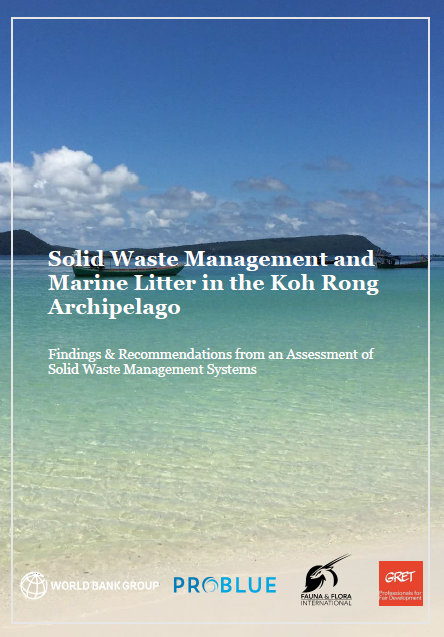
2021 | Fauna and Flora International
Keywords:
Marine litter is a complex and multifaceted threat necessitating systemic reform and collaborative solutions. Innovation and coordinated action are essential, but interventions must be framed within the Cambodian context and empower local leadership and action. This study focuses on absence of adequate solid waste management (SWM) as a key driver of Cambodia's marine litter & plastic pollution. As such, the study assesses solid waste management (SWM) in the Koh Rong Municipality (KRA) with a focus on its relevance to marine litter and macro-plastic pollution in the Koh Rong Marine National Park (KRMNP). Findings from this assessment have been used to develop a series of policy and onsite recommendations to improve SWM and reduce marine plastic pollution in the KRMNP. This report and its recommendations also speak to broader action under The World Bank’s National Plastics Action Plan and Road Map.

2022 | Fauna and Flora International
Keywords:
The Koh Rong Archipelago (KRA) was officially designated as Cambodia’s first, large-scale marine fisheries management area (MFMA), alternatively known as national marine park (NMP) or marine protected area (MPA). Currently, similar effort led by the national government in partnership with Flora & Fauna International is underway to officialise Koh Sdach Archipelago (KSA) as another MFMA in the country. However, recently, marine plastic pollution has been identified as a pressing threat not only to the marine life of these archipelagos, but also to the local economies and the health and wellbeing of local inhabitants. Therefore, primary research was done in KRA and KSA to gain a comprehensive
understanding of the status and drivers of plastic pollution in these locations, and the main goal of this document is to explore specific, locally appropriate measures for tackling marine plastic pollution in the ocean or on the shoreline (due to lack of other disposal alternatives).
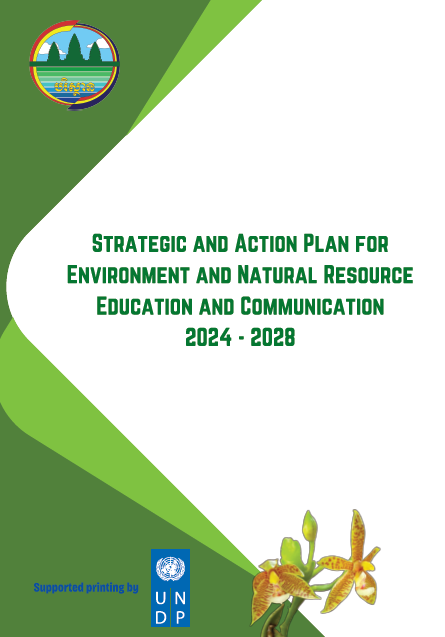
2024 | Ministry of Environment (MOE) of Cambodia
Keywords:
Enhancing institutional capacity, public awareness and deepening knowledge about the benefits of natural resources, ecosystem services, and their potential impacts on every aspect of life - from the air we breathe and the water we drinhk to the food we consume and the landscapes we inhabit - are essential to ensuring sustainable management of our environment and natural resources. Through sharing awareness, knowledge, information and data on the state of the environment and natural resources, as well as innovative solutions, we empower citizens to work together to protect the planet for future generations and ensure its sustainable use.
Recognizing the critical importance of this endeavor, the Ministry of Environment has developed the Strategic and Action Plan for Environment and Natural Resource Education and Communication to serve as a comprehensive roadmap, aims to address potential environmental challenge domestically, regionally and globally, while implementing the third angle of the core strategy of the Environmental Circular Strategy 2023-2028 “Cleanliness, Greenness and Susainability” in response to the Pentagonal Strategy Phase I of the Royal Government.
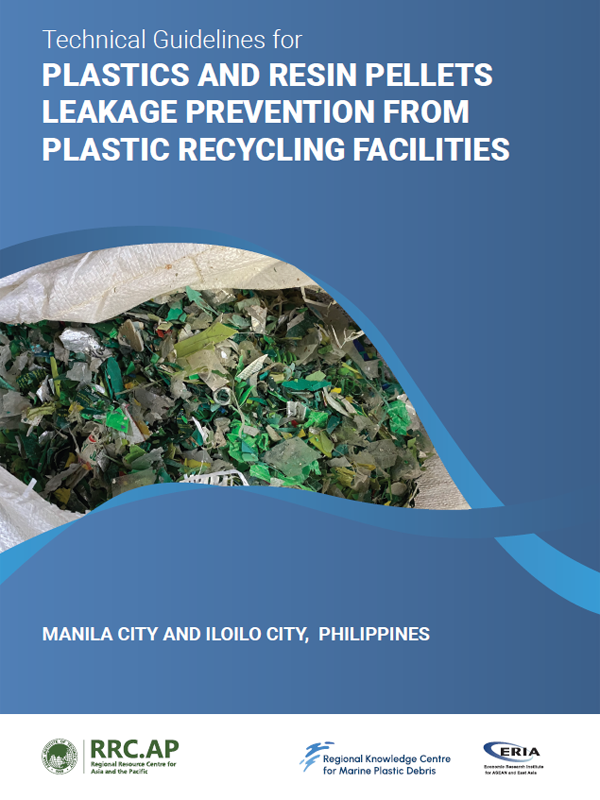
2024 | AIT RRC.AP
Keywords: plastic, resin pellets leakage
Technical Guidelines for Plastic and Resin Pellet Leakage Prevention from Plastic Recycling Facilities, Manila City and Iloilo City - Philippines
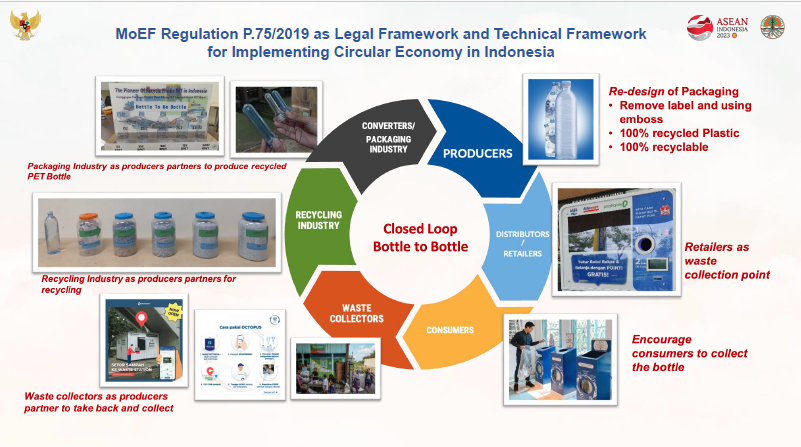
2023 | Ministry of Environment and Forestry (MoEF)
Keywords:
The document provides a comprehensive overview of the current state of solid waste management in Indonesia, focusing on the critical issue of plastic waste. It begins with an analysis of national solid waste management data, highlighting the scale and impact of plastic waste in the country. The document delves into the challenges faced in managing plastic waste and examines the state of plastic recycling efforts. It outlines the targets, strategies, and goals set by the Indonesian government for effective solid waste management, emphasizing the role of producers in reducing waste. Additionally, the document explores the implementation of a circular economy and offers strategies to accelerate producer responsibility in waste reduction, aiming to foster a more sustainable and environmentally-friendly waste management system in Indonesia.
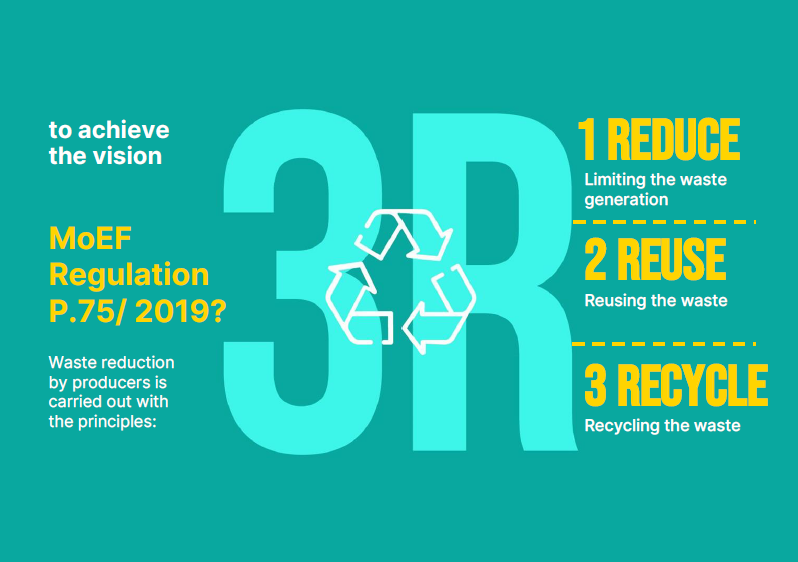
2023 | Ministry of Environment and Forestry (MoEF)
Keywords:
The document provides a thorough analysis of the efforts made towards fostering responsible and sustainable production and consumption in Indonesia's manufacturing, food and beverage services, and retail sectors. Aligning with the principles of a circular economy, the document highlights the significant efforts by producers to minimize waste and integrate sustainable practices. It details the progress and challenges faced in reducing plastic waste, improving recycling rates, and promoting the reuse of materials. By focusing on the implementation of the Waste Reduction Roadmap as outlined by MoEF P75 2019, the document underscores the commitment to transforming production and consumption patterns.
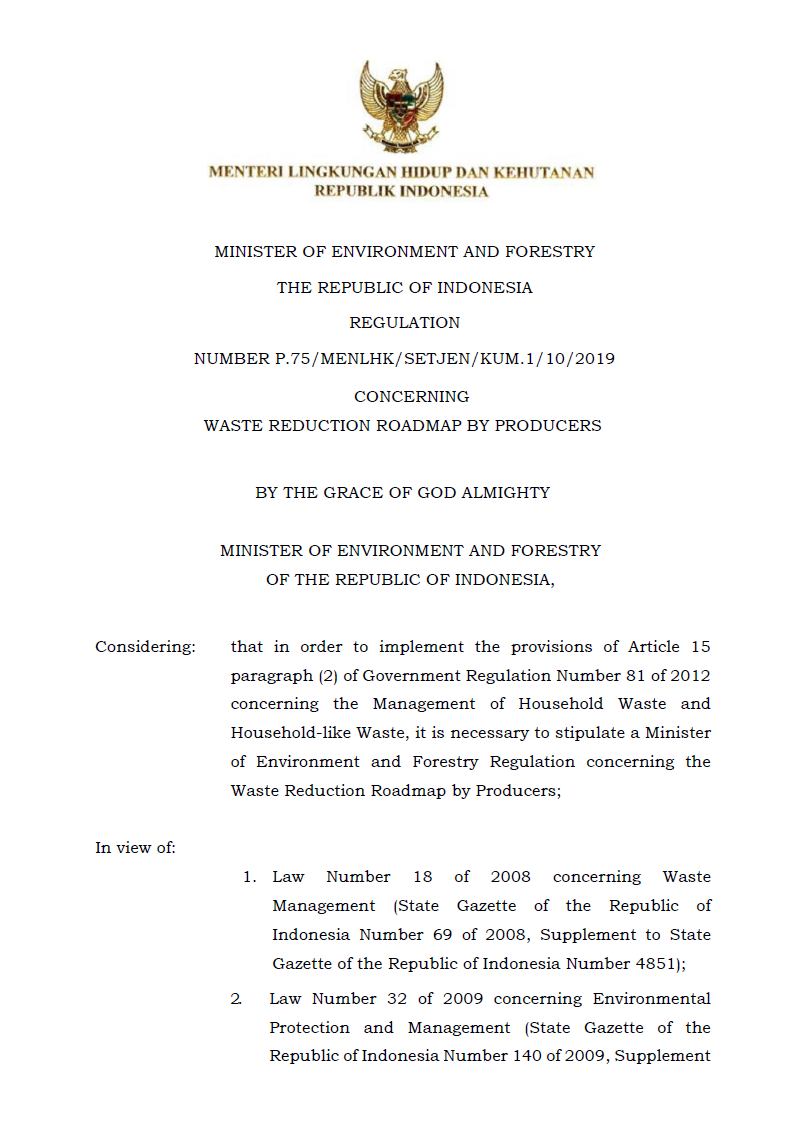
2019 | Ministry of Environment and Forestry (MoEF)
Keywords:
The Indonesian Minister of Environment and Forestry (MoEF)'s Regulation Number P.75 of 2019 concerning Waste Reduction Roadmap by Producers, establishes guidelines for reducing plastic waste by producers effort, particularly targeting packaging and single-use plastics. This regulation aims to promote environmental sustainability by encouraging the reduction (R1), recycling (R2), and reuse (R3) of plastic packaging. It mandates planning and measures for the take-back, management, and control of Solid Waste from product, product packaging, and containers. The ultimate goal of this regulation is to enforce the responsibility of producers or Extended Producers Responsibility (EPR) for reducing waste to the landfill, guide and facilitate the producers, including brand owners, manufacturers, importers, retailers, and the F&B industry.
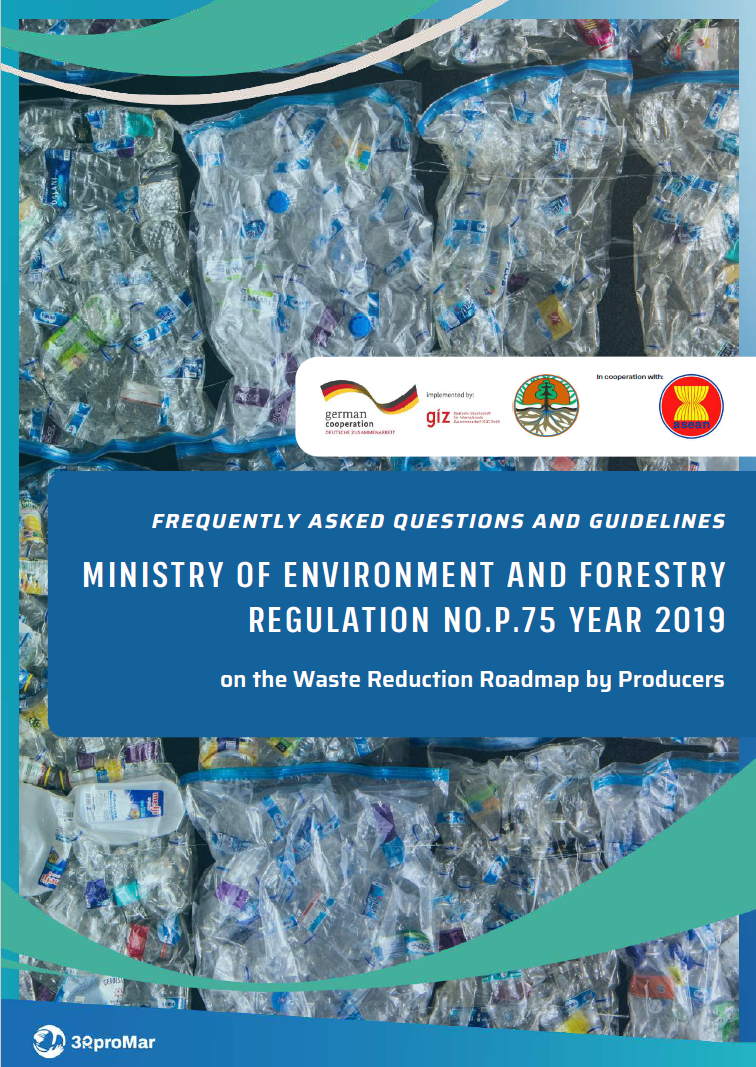
2024 | Ministry of Environment and Forestry (MoEF)
Keywords:
To enhance producers' understanding of MoEF Reg No.P.75/2019 and develop a roadmap for waste reduction, the Directorate of Waste Reduction MoEF, in collaboration with GIZ 3RproMar Indonesia and Nara Synergy, established a Frequently Asked Questions (FAQs) and Implementation guidelines for MoEF Reg No.P.75/2019. These FAQs and Guidelines were compiled based on questions and feedback from producers and various other parties. Through these FAQs and the guide, producers are expected to understand, compile the roadmap for waste reduction by producers, and implement the roadmap so that the waste reduction targets can be achieved.
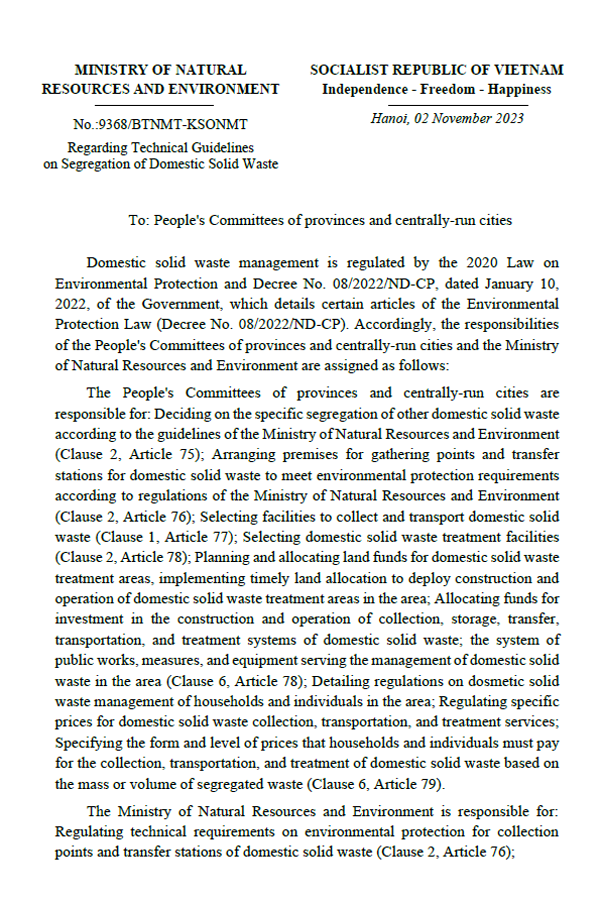
2023 | Ministry of Natural Resources and Environment (MONRE)
Keywords:
This technical guidelines aims to facilitate the identification of various types of domestic solid waste generated from households and individuals and segregate them into three main waste groups, as outlined in Clause 1, Article 75 of the Law on Environmental Protection. These groups include (1) Solid waste that can be reused and recycled; (2) Food waste; (3) Other domestic solid waste.
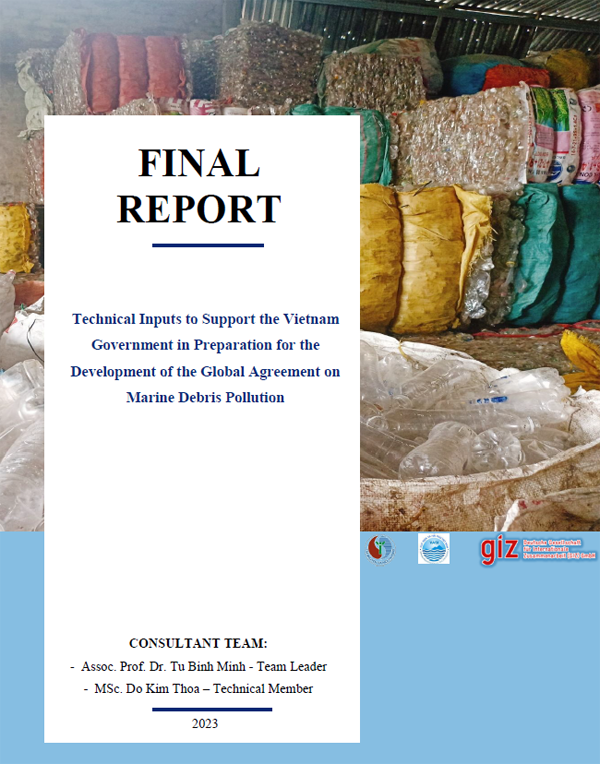
2023 | Ministry of Natural Resources and Environment (MONRE)
Keywords:
This report falls under the framework of the German – ASEAN Regional Project “Reduce, Reuse and Recycle to Protect the Marine Environment and Coral Reefs” (3RproMar), which aims to assist the ASEAN Member States (AMS) in enhancing their implementation capabilities to reduce land-based waste leakage and protect the marine environment.
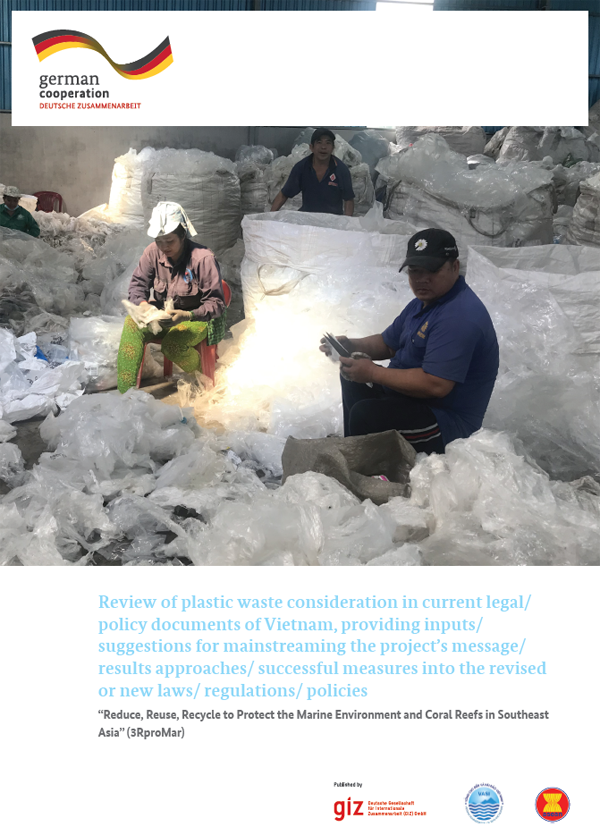
2023 | Ministry of Natural Resources and Environment (MONRE)
Keywords:
Review of plastic waste consideration in current legal/policy documents of Vietnam, providing inputs/ suggestions for mainstreaming the project’s message/ results approaches/ successful measures into the revised or new laws/ regulations/ policies
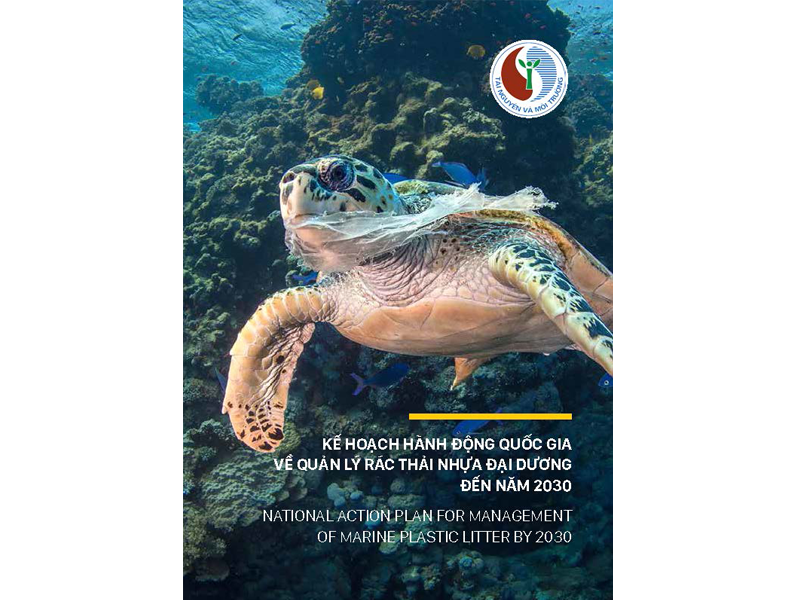
2020 | Ministry of Natural Resources and Environment (MONRE)
Keywords:
Vietnam has made strong political commitments and has carried out practical activities to manage and reduce plastic waste, including ocean plastic waste. Resolution No. 36-NQ / TW of October 22, 2018 of the Eighth Conference of the Party Central Committee XII on the strategy for sustainable development of Vietnam’s marine economy to 2030, with a vision to 2045, set the goal of “Preventing, controlling, and significantly reducing pollution of the marine environment; becoming a regional leader in minimizing ocean plastic waste.”
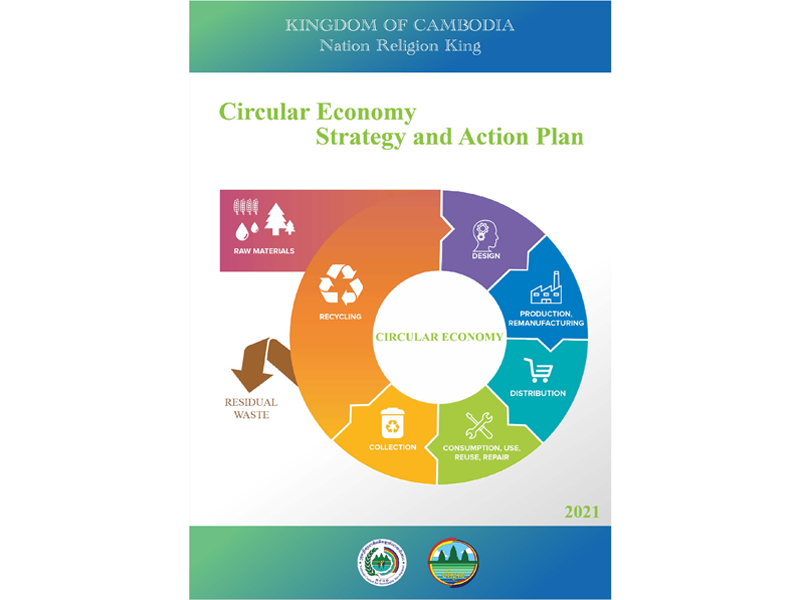
2021 | Department (DGE) of Green Economy of Secretariat General for Sustainable Development (GSSD), National Council for Sustainable Development (NCSD)
Keywords:
This Circular Economy (CE) Strategy and Action Plan outlines the key vision, mission, strategies, and roadmap for Cambodia to transition towards a circular economy. The overarching goal is to enable the country to achieve a prosperous economy, a thriving and inclusive society, and a healthy environment. This will be achieved through more efficient and sustainable use of energy and material resources, while maximizing resource value and creating new economic opportunities for the country.
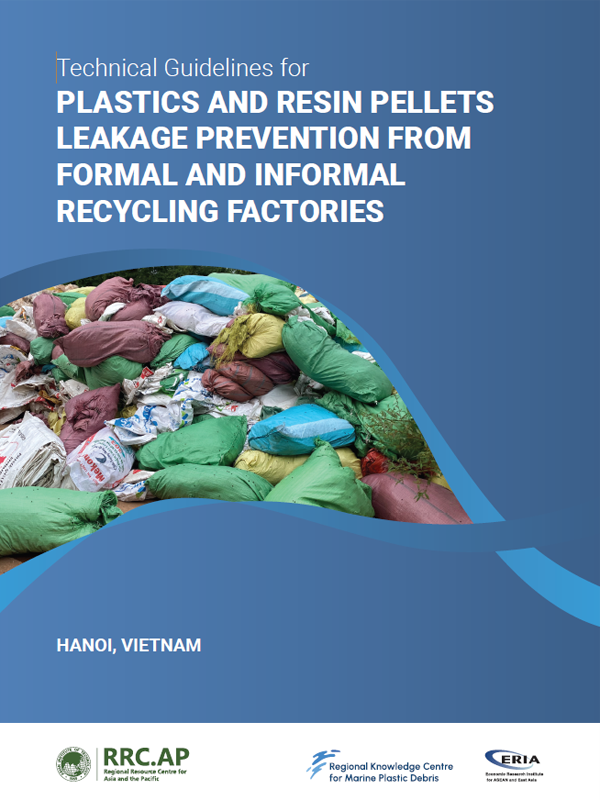
2024 | AIT RRC.AP
Keywords: plastics, pellet leakage prevention
These guidelines aim to provide a framework for preventing recycling-related plastic and pellet losses, and environmental leakage. The guidelines are useful for a broad spectrum of stakeholders, particularly policymakers and key plastic recycling actors, including informal waste pickers, junkshops, consolidators, and plastic recycling craft villages. The application of these guidelines is expected to contribute to improving production efficiency in the plastic recycling chain while preventing plastic leakage into the environment.
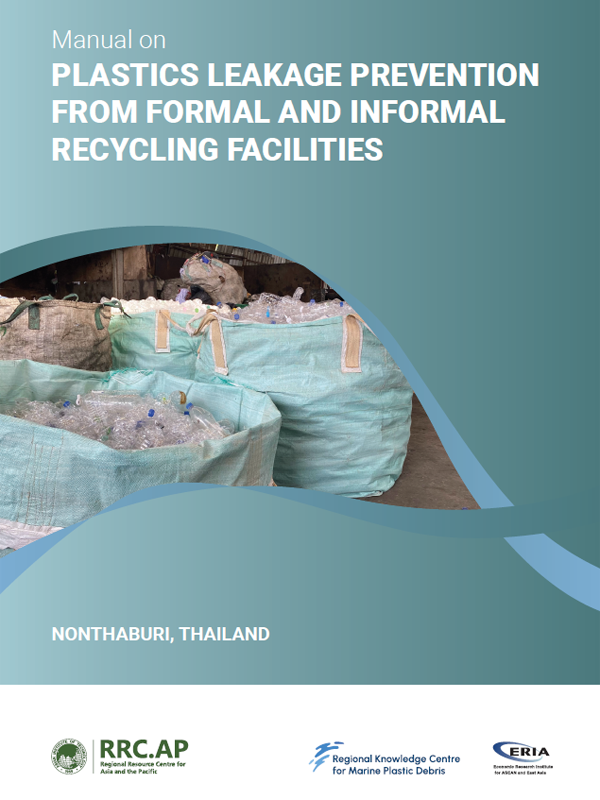
2024 | AIT RRC.AP
Keywords: plastic, resin pellets leakage
The manual aim to support both formal and informal recycling enterprises in preventing plastic pollution by advocating best practices and promoting proper housekeeping within informal recycling facilities.
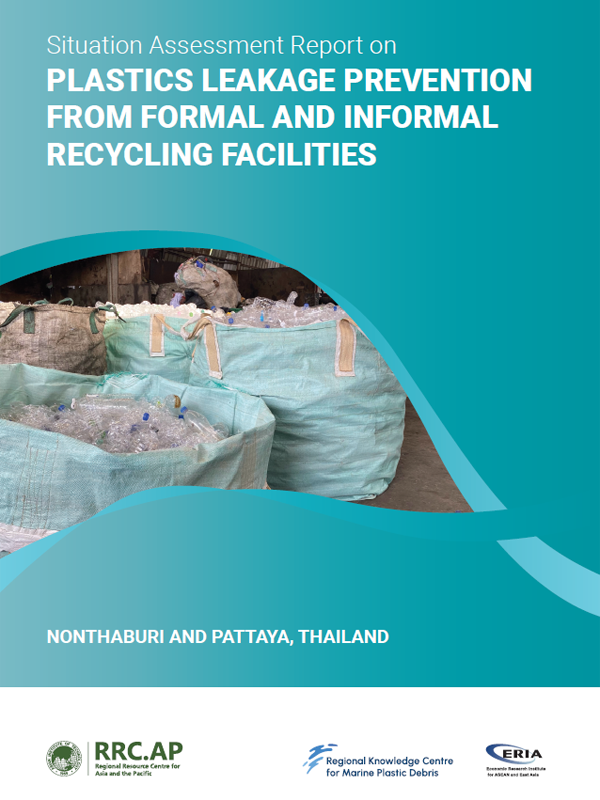
2024 | AIT RRC.AP
Keywords: plastic, resin pellets leakage
The main goal of this study is to evaluate plastic and pellet losses and leakage from the logistical handling and pre-processing operations of informal recycling groups in Thailand, focusing on recovered post-consumer plastic waste and factory processing operations. The focus areas of this study are the Nonthaburi Municipality and Pattaya City.
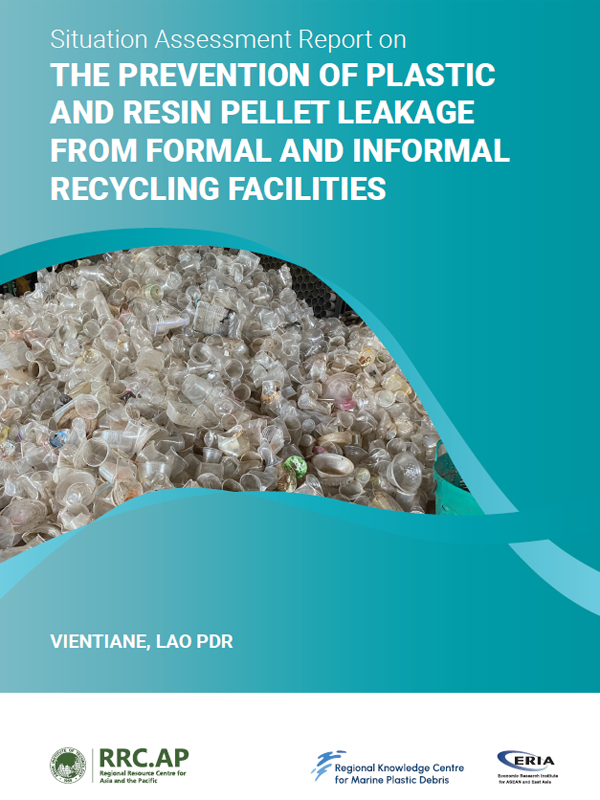
2024 | AIT RRC.AP
Keywords: plastic, resin pellets leakage
This study was conducted following on a simplified three-step approach: 1) collect and analyse data and information relevant to plastic leakage from informal sector recycling; 2) engage with key stakeholders; and 3) disseminate the outcomes of the study.
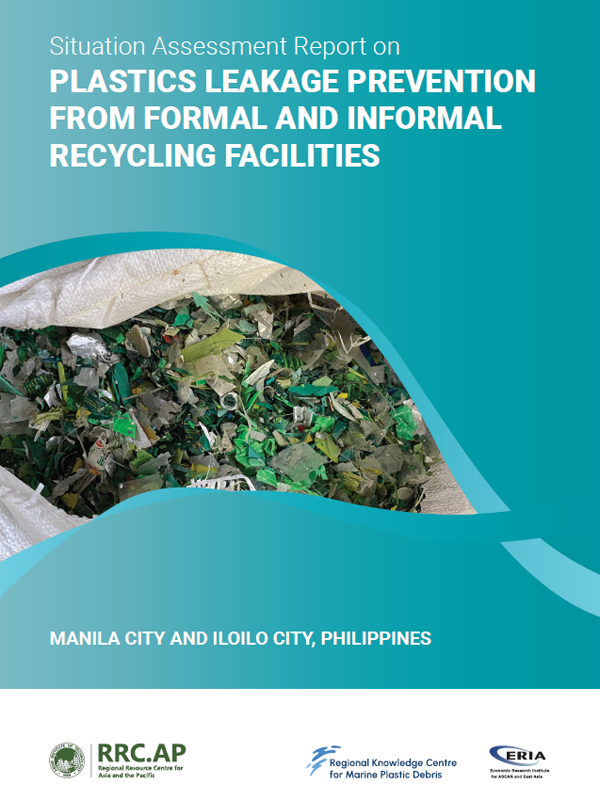
2024 | AIT RRC.AP
Keywords: plastic, resin pellets leakage
Situation Assessment Report on Plastic Leakage Prevention from Formal and Informal Recycling Facilities, Manila City and Iloilo City - Philippines
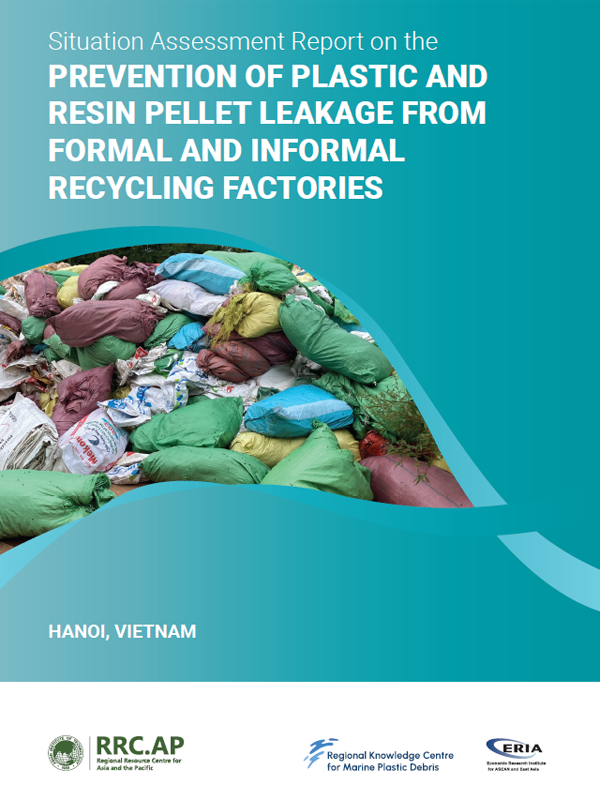
2024 | AIT RRC.AP
Keywords: plastic, resin pellets leakage
Situation Assessment Report on the Prevention of Plastic and Resin Pellet Leakage from Formal and Informal Recycing Factories, Hanoi - Vietnam
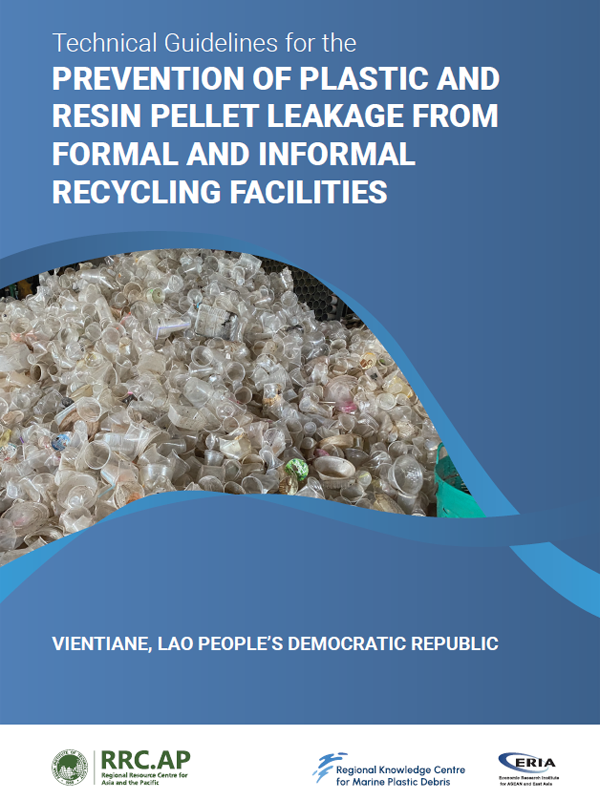
2024 | AIT RRC.AP
Keywords: plastic, resin pellets leakage
The guidelines aim to fill knowledge gaps and promote contextually appropriate best practices. They will also encourage industry actors to implement measures to prevent and contain plastic and pellet leakages. Based on the findings of a preliminary assessment of the post-consumer plastic recycling value chain, which analyzed primary sources of plastic loss and leakage, including technology applications, resource availability, access, and regulatory and policy gaps, these guidelines are designed.
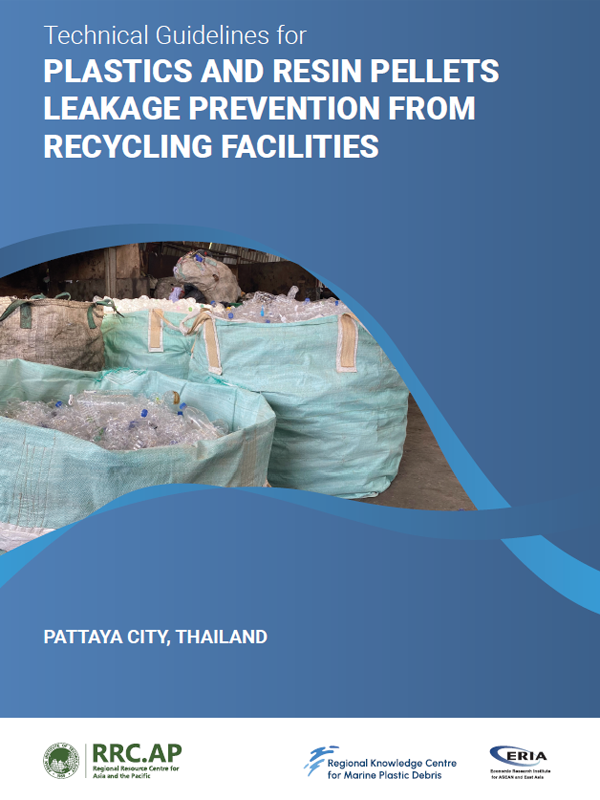
2024 | AIT RRC.AP
Keywords: plastic, resin pellets leakage
The overall objective of the technical guideline is to prevent plastics and resin leakage into the marine environment through the promotion of best technologies and practices at resin-producing factories and informal recycling facilities in Pattaya city.

2017 | AIT RRC.AP
Keywords: waste management
This summary report examines the waste management landscape in 10 Association of Southeast Asian Nations (ASEAN) Member States. This report begins with the statistics on the trends of population growth, urbanization, and economic growth in each of the ASEAN countries, which is then followed by an overview of the waste generation, collection, treatment & recovery, and disposal statistics, and associated environmental, technical, and governance (institutions, policy, regulations) factors in the waste sector. The report also identifies the existing waste management challenges and gaps therein, and sets out recommendations.

2017 | AIT RRC.AP
Keywords: waste management
The Asia Waste Management Outlook (AWMO) provides an overview of the challenges and opportunities in waste management in the context of Asia. The AWMO is not intended to be a directory of wasterelated data or statistics; rather, it is intended to provide a perspective with prescriptions for a variety of stakeholders to encourage early action. It is also intended to provide an overview of the current status, current cutting-edge thinking, and the future of solid waste management in Asia over the medium term.
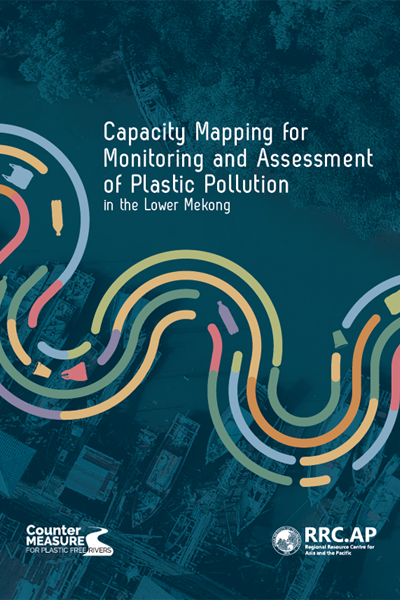
2020 | AIT RRC.AP
Keywords: Marine plastic
This report presents findings of capacity-mapping study on the monitoring and assessment of plastic pollution in the Lower Mekong Region. The study was conducted as part of the UN Environment Regional Office for Asia and the Pacific's project titled the *Promotion of ConterMEASUREs against Marine Plastic Litter in Southeast Asia and India" (hereafter, referred to as * ConterMEASURE project"). The CounterMEASURE project aims to develop a region-based approach for the monitoring and assessment of land-based plastic waste leakage and for pollution reduction into inland water ways, such as rivers, canals and drainage systems, and the eventual transport of plastic waste into the oceans.